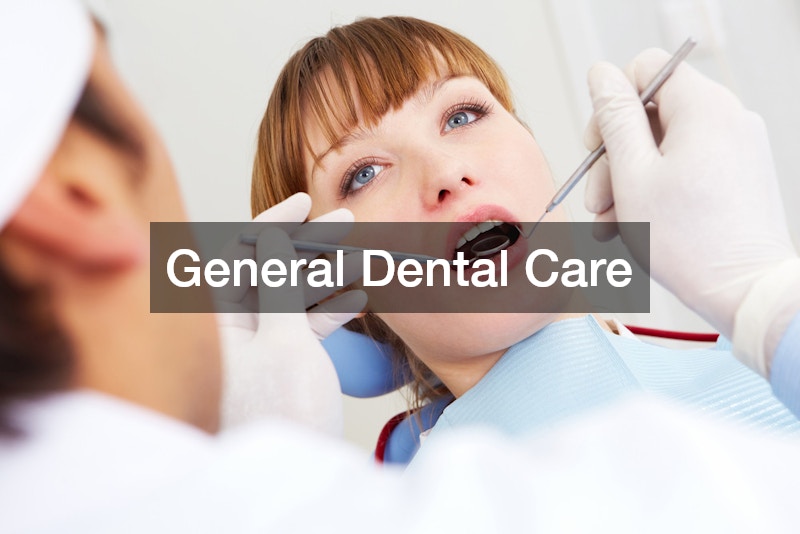Oral wellness is a vital part of overall health. Since a smile is often the first thing people notice, maintaining its appearance greatly impacts personal confidence and grooming. This detailed guide covers important aspects of maintaining healthy teeth and gums, the professionals who support your oral health, and the variety of treatments available to keep your smile bright. By gaining a better understanding of dental care options, you can make informed choices and find the best solutions for your needs. From routine check-ups to advanced aesthetic treatments, modern oral health services offer comprehensive options for everyone. Whether you’re interested in brightening your smile or restoring missing teeth, this guide will provide the essential knowledge to help you navigate your journey to better oral health.

General Dental Care
General dentistry encompasses a wide range of services aimed at preserving oral health. Regular check-ups with a dentist can help detect issues early on, preventing them from progressing into more serious problems. One of the essential facts about a dentist is that they are trained not only to address current problems but also to provide preventative care to avoid future dental issues.
During a typical visit to a general dentist’s office, patients can expect examinations, cleanings, and consultations regarding their dental health. These appointments allow for the monitoring of oral hygiene and the identification of areas needing improvement. In addition, general dentists offer advice on practices that can enhance dental care, such as proper brushing techniques and dietary choices that promote healthy teeth.
Another important aspect of general dentistry is its ability to treat common conditions like cavities or gum disease. A dentist is responsible for educating patients about the signs of these ailments and how to prevent them through conscientious effort. Fully understanding the facts about a dentist allows patients to appreciate the value of maintaining regular visits and following their recommendations for optimal dental health.
Choosing Safe Whitening Options
Teeth whitening is an increasingly popular option for those looking to enhance their smile. There are numerous over-the-counter products available, but the safest and most effective options are often provided by a dentist. Seeking guidance from a professional can help avoid potential risks associated with improper use of whitening treatments.
Many factors affect whitening results, including the starting color of the teeth and the type of stains present. A dentist can conduct an assessment to recommend the most suitable whitening procedure tailored to an individual’s needs. By relying on a professional, patients can benefit from facts about a dentist that suggest that customized treatments tend to yield better and safer results.
In-office whitening procedures conducted by cosmetic dentists often utilize stronger agents that can deliver impressive results in a single visit. This professional approach offers patients confidence in achieving their desired level of whiteness while minimizing the risk of damage to the teeth and gums. Thus, individuals considering teeth whitening should prioritize consulting with their dentist for the best outcome.
Understanding Tooth Replacement
Dental implants have revolutionized the approach to tooth replacement, providing a durable and aesthetic solution for individuals with missing teeth. Unlike traditional dentures, dental implants are surgically embedded into the jawbone, offering a stable foundation for crowns that mimic the appearance of natural teeth. This method has gained popularity due to its longevity and the natural feel it provides compared to other options.
A significant fact about a dentist is their ability to assess whether a patient is a good candidate for dental implants, considering factors such as bone density and overall oral health. If a patient has sufficient bone structure, the dental implant procedure can result in a seamless integration with the existing teeth. Consequently, consulting with a dentist is essential for understanding the prerequisites and potential outcomes of this procedure.
Additionally, dental implants can help maintain jawbone integrity and prevent the sunken appearance that can occur with tooth loss. The process involves multiple steps, including consultation, surgery, and follow-up visits for crown placement. Being informed about the dental implant process emphasizes the importance of maintaining regular contact with a dentist for optimal oral health.

Exploring Teeth Alignment Solutions
Orthodontic dentistry services focus on correcting misaligned teeth and jaws to improve both function and appearance. Treatments may include traditional metal braces, ceramic braces, or clear aligners, each tailored to the individual’s needs and preferences. This type of dental care can significantly influence a person’s confidence and contribute positively to their oral health.
One important fact about a dentist who specializes in orthodontics is their advanced training in the complexities of tooth movement. Orthodontists are equipped with the knowledge to create individualized treatment plans that can enhance alignment and occlusion. By exploring these options, patients can find the most effective method to achieve the smile they desire.
Effective teeth alignment can also alleviate issues such as overcrowding, misaligned bites, and jaw tension. By addressing these problems early on, patients can prevent more severe complications in the future, highlighting the preventive nature of orthodontic treatment. Therefore, regular check-ups with a dentist can lead to timely interventions and promote healthier oral development.
Recognizing When Surgery Is Necessary
Maxillofacial surgeons play a critical role in addressing complex dental and facial issues that cannot be managed through standard dental procedures. These specialists are trained to perform surgeries for conditions such as jaw misalignment, facial trauma, or congenital abnormalities. Understanding the circumstances that might necessitate a referral to a maxillofacial surgeon can empower patients to seek appropriate treatment in a timely manner.
Many patients may not realize that a dentist often collaborates closely with maxillofacial surgeons to develop comprehensive treatment plans. A significant fact about a dentist is their ability to identify when a surgical intervention is essential and to communicate these needs to the patient. This partnership ensures that individuals receive the most effective and efficient care possible for intricate dental conditions.
Surgeries performed by maxillofacial surgeons can lead to significant improvements in both functionality and aesthetics. By addressing underlying issues such as jaw alignment and facial symmetry, these surgeries enhance the overall quality of life for patients. Thus, recognizing when surgery is necessary is an integral aspect of comprehensive dental care.
Enhancing Smiles with Precision
Cosmetic dentistry focuses on improving the appearance of teeth, gums, and smiles through various procedures. This form of dentistry encompasses treatments such as veneers, bonding, and teeth whitening, each designed to enhance a person’s aesthetic appeal while improving confidence. Understanding facts about a dentist who specializes in cosmetic procedures can help patients make informed choices about enhancing their smiles.
Patients often seek the expertise of a cosmetic dentist to achieve their desired outcomes, particularly when seeking a transformative smile. With innovative techniques and materials, cosmetic dentistry allows for precise and aesthetically pleasing results. Notably, these professionals undergo specialized training to understand the nuances of smile aesthetics and facial balance.
Cosmetic procedures can be performed in conjunction with restorative treatments to address both functionality and appearance. For instance, a dental crown not only restores a damaged tooth but can also be crafted to match the natural color and shape of surrounding teeth. This holistic approach to dental care ensures that patients fulfill their aesthetic and functional dental needs seamlessly.

Preparing for Your Dental Visit
Preparing for a visit to the dentists office is essential for ensuring a smooth appointment. Patients should gather essential information such as medical history, current medications, and any specific dental concerns ahead of time. This proactive approach allows the dentist to provide tailored care that considers the patient’s unique health profile.
Another important aspect to consider is the necessity of keeping to scheduled appointments for routine check-ups and cleanings. By consistently attending these visits, patients can enable their dentist to monitor oral health effectively and prevent complications. Understanding the significance of regular visits emphasizes the vital relationship between patients and their dentists.
Also, it is beneficial for individuals to ask questions and voice any concerns they may have during their appointment. A significant fact about a dentist is that they are more than willing to explain procedures, discuss treatment options, and provide guidance on maintaining oral hygiene. Open communication fosters trust between patients and dentists, enhancing the overall experience.
Restoring Teeth with Crowns
A dental crown is a common restorative procedure used to restore the shape, size, and strength of damaged teeth. They can be an ideal solution for teeth that have severe decay, fractures, or have undergone root canal therapy. A tooth crown offers not only functional restoration but also aesthetic enhancements, blending seamlessly with surrounding teeth.
When a dentist decides that a crown is necessary, they will prepare the tooth by removing a portion of its structure. Subsequently, an impression is made to craft a custom crown that fits precisely, ensuring comfort and function. Understanding facts about a dentist’s expertise in this area allows patients to feel more confident during their treatment.
Depending on the materials used, dental crowns can mimic the appearance of natural teeth while providing durability. Patients can discuss options such as porcelain, ceramic, or metal crowns with their dentist to determine the best fit for their needs. This level of customization further underscores the importance of open dialogue between patients and dentists in choosing the right restorative solution.
Correcting Teeth with Specialists
An Orthodontist is a specialist uniquely trained to diagnose, prevent, and treat misaligned teeth and jaws. Their expertise aims to improve oral function while enhancing aesthetic appeal, making them crucial for individuals needing specialized dental care. Consulting with an orthodontist is essential for patients seeking optimal alignment outcomes.
Treatment options provided by orthodontists include traditional braces, clear aligners, and other corrective appliances. These devices work to guide teeth into their proper positions over time. Understanding facts about a dentist’s specialized training in orthodontics can help patients appreciate the value of pursuing treatment from a trained expert.
Moreover, orthodontic treatments serve a dual purpose by correcting alignment while also promoting better overall oral health. Misaligned teeth can lead to complications such as gum disease or excessive wear on teeth. Therefore, seeking the assistance of an orthodontist is an essential step toward achieving both aesthetic and functional benefits.

Building Lifelong Dental Habits
Developing and maintaining lifelong dental habits is crucial for achieving optimal oral health. Regular brushing, flossing, and visiting the dentist can significantly reduce the risk of dental issues. General dentistry emphasizes the importance of preventive care and lifestyle choices that contribute to lasting dental hygiene.
Patients should also be encouraged to adopt healthy eating habits that avoid excessive sugar and acidic foods, which can harm tooth enamel. Understanding how diet impacts dental health is essential for fostering good habits. Sharing these facts about a dentist’s role in promoting healthy choices can motivate individuals to take ownership of their dental care.
Furthermore, educators, parents, and dental professionals have a shared responsibility to emphasize the importance of evolving dental habits from an early age. Consistency in daily oral hygiene routines combined with regular dental visits establishes a strong foundation for lifelong dental health. By prioritizing preventive care, individuals can significantly enhance their quality of life.
Understanding the various aspects of dental care is essential for maintaining optimal oral health. Throughout this guide, we have discussed significant facts about a dentist, the variety of treatments available, and the importance of preventive care. From general dentistry services to specialized treatments such as dental implants and orthodontic care, each aspect contributes to ensuring a beautiful and healthy smile.
We learned about teeth whitening options, restorative treatments like dental crowns, and how to prepare for dental visits effectively. Each component of dental care has its unique significance, and working closely with a dentist can facilitate informed decisions regarding treatments and practices. By building lifelong dental habits and seeking appropriate care, individuals can achieve the smiles they desire and enjoy lasting health benefits.
By prioritizing dental visits and adopting preventive measures, individuals can embark on a journey toward excellent oral health. Armed with knowledge about their options and guided by a dentist’s expertise, patients can take ownership of their dental well-being. Ultimately, successful dental care combines professional insight with personal commitment to foster a bright and healthy smile.




